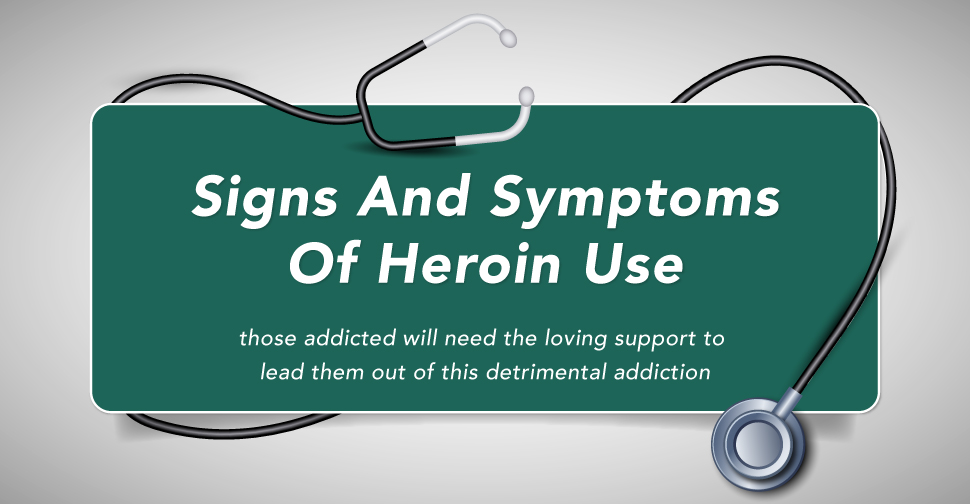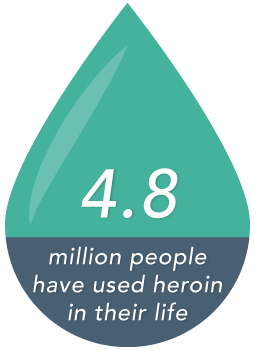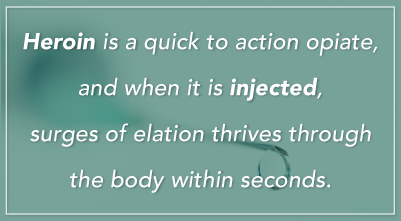
The Substance Abuse and Mental Health Services Administration (SAMHSA) notes that 4.8 million people, 12 years of age and older, confessed that they have used heroin during their life. With these numbers, chances are, many people may be unaware of the issues their family members are facing with this drug. Being the loved one of a drug user, your concerns can grow high and it may feel as if things are out of your control. Despite this, understanding heroin abuse can help you to better support your loved one, and get them help.
One of the biggest problems you may face, is that a drug user is very rarely honest with themselves about the substances that they are abusing, or the damage it is causing them. Many users are secretive, trying to mask their habits or symptoms. For this reason, if you’re trying to reach out to help someone you suspect is using heroin, it can be helpful to be aware of the signs and symptoms that point to heroin use and abuse.
Evidence Of A Heroin Habit
 Since heroin is usually smoked, snorted, or injected, you may find evidence and remains of the drugs or paraphernalia. Many people may keep their supplies assembled in a kit, in a small bag or case, which may be hidden. Examples of heroin paraphernalia may include:
Since heroin is usually smoked, snorted, or injected, you may find evidence and remains of the drugs or paraphernalia. Many people may keep their supplies assembled in a kit, in a small bag or case, which may be hidden. Examples of heroin paraphernalia may include:
- Traces of a tan or whitish powder
- Dark, sticky residue
- Burnt spoons
- Small glass or metal pipes
- Syringes
- Rubber tubing, ropes, or belts in proximity to other items—people use these devices to make their veins enlarge prior to injection
- Tiny baggies or balloons that contained the drug
- Lighters, if they’re not a smoker
- Candles, for heating the heroin
- Materials used for a filter, may include the tip of a cotton swab or a cigarette filter
- Burnt squares of foil
- Straws, foil rolled into a tube, or an empty pen case—these items are used to inhale the vapors when the heroin is heated
When a person is seeking a fix, they may be very desperate, and very inventive, thus they may use whatever they have near as a vessel for using heroin. For instance, you may find a pop or soda can that appears burnt, that an individual used to heat heroin. If you find any of these things, we caution you to be very careful, and refrain from handling these items, if at all possible, as some of these items may transmit various infectious diseases like HIV and hepatitis C. Also, it is a criminal offense to be in possession of paraphernalia.
What Happens To The User?
Heroin is a quick to action opiate, and when it is injected, surges of elation thrive within the body in seconds. When the drug abuser uses it in another way, they may not feel the euphoria as sharply. When a person uses heroin, there are some telltale physical and behavioral signs that you can look for that are indicative of heroin abuse, as well as some more serious symptoms that result from more prolonged use.
Physical Signs And Symptoms
When a person uses heroin, it converts back into morphine when it enters the user’s brain. At this point, the morphine binds to opioid receptors within the brain, including those in the brainstem, effectively altering certain automatic processes that are essential for life, including, according to the National Institute on Drug Abuse (NIDA), blood pressure, arousal, and respiration. This change is responsible for some of the outward signs that you may see in a heroin user. Here are some physical signs and symptoms you can look for that may manifest from heroin use:
 Injection site marks, including scars or scabs
Injection site marks, including scars or scabs- Constipation, you may find laxatives because of this
- Dry mouth
- Runny nose
- Constricted or tiny pupils
- Respiratory depression (shallow breathing)
- Sleepy eyes
- Flushed skin
- Tendency to nod off, then alternate back to a more wakeful state
- Reduced blood pressure and body temperature
A heroin user may have a low immunity to illness. Any pain the user is experiencing will be significantly suppressed, since opioids are known for their pain relief. Pregnant women can also experience a spontaneous abortion, otherwise known as a miscarriage.
Long-term heroin use creates more serious complications, including various risks that result from injection. According to NIDA, these may include collapsed veins, a breakout of bacterial skin infections at the injection site, abscesses, diseases of the liver and kidneys, infective endocarditis, and various infectious diseases, including HIV and hepatitis B or C.
Sometimes, a user may not be able to find more drugs right away, and may begin to encounter the symptoms of withdrawal. These can occur in as little as 6-12 hours after the last dose. It can be useful to understand the physical symptoms of withdrawal as well, in order to spot a heroin problem. Some signs of withdrawal include:
- Restlessness
- Shaking or spasms
- Nausea, may be accompanied by vomiting
- Chills and goosebumps
- Difficulty sleeping
- Anxiety or nervousness
- Pain in your muscles and bones
Please be aware that withdrawal from heroin can be very uncomfortable, and we recommend that an individual never attempt to undergo it on their own. Instead, we recommend detoxing from heroin in a medically supervised environment.
Behavioral Signs
Heroin, like any drug, alters a person’s behavior. These changes can often help to point you towards a problem. They include:
- Cognitive troubles and disorientation
- Unstable mood
- Impaired decision-making or self-control
- Lack of motivation
- Scratching
- Slurred speech
- Neglect of grooming and personal hygiene
- Failure to eat
- Covering arms with long sleeves
- Alienating themselves from loved ones
- Spending time with people that use
- Use of drug slang (Smack, Junk, etc.)
- Stealing valuables or money to cover their drug habit
- Changes in performance within their school or work responsibilities
If you witness any of these signs, alone or paired with any of the aforementioned physical symptoms, there is cause for concern. Please reach out to a professional in order to avoid the risk of further medical complications or overdose.
Also, for many people, prescription opioid abuse precedes heroin abuse. Young people who have injected heroin have been reported to misuse prescription opioids before they started to abuse heroin. For this reason, if you have known your loved one to abuse prescription drugs, and witness any of these signs or symptoms, without any apparent use of pills, there may be cause for concern.
Understanding The Signs Of Overdose
 Overdose can happen at any point. When a heroin overdose happens, it will cause slow or shallow breathing, blue lips and fingernails, low blood pressure and pulse, clammy skin, delirium, convulsions, and coma. If you suspect an overdose, seek help immediately, as overdose can be fatal.
Overdose can happen at any point. When a heroin overdose happens, it will cause slow or shallow breathing, blue lips and fingernails, low blood pressure and pulse, clammy skin, delirium, convulsions, and coma. If you suspect an overdose, seek help immediately, as overdose can be fatal.
A Person Addicted To Heroin Will Need A Helping Hand
Many of those addicted to heroin often times don’t see how this addiction is ultimately creating damage to his or her life. They may go through life neglecting their own needs. The desire for the drug will likely far outweigh anything else on their daily to-do list, or their need for self-care. Lack of nutrition will create a very haggard look, and they will progressively look worse when the drug use is heavy and prolonged.
Some of these individuals may reach out for a helping hand, but many of them may fear the painful sickness of dealing with their own withdrawal, and continue using to avoid this uncomfortable state. It can be vastly beneficial if loving family members step up to give their loved ones a hand to hold, and support during these troubled times, so that together, you can find treatment for their heroin addiction. Those addicted to heroin need a good treatment program to lead them out of this detrimental addiction and help them get through the withdrawal stages.
By knowing the signs and symptoms of heroin use, a loved one may be able to uncover an addiction and start to make arrangements for rehabilitation for that individual. With this information, family members can see behind the denial, with the love and compassion that is necessary to help a person into a rehab center.
Stop The Destruction, Get Help Today
If you or a loved one exhibits any of these symptoms or signs of heroin abuse, reach out for a helping hand today. Our compassionate staff is standing by to offer you more information on heroin abuse and addiction, and the treatment options that exist to help. Please contact us at DrugRehab.org today.

For More Information Related to “Signs And Symptoms Of Heroin Use” Be Sure To Check Out These Additional Resources From DrugRehab.org:
- Common Street Names For Illegal Drugs
- How Do I Get My Loved One Into Rehab?
- Heroin and Opioid Addiction Statistics
- Environmental Risk Factors for Developing an Addiction
- Heroin Addiction And Depression
- Heroin Mixed With Fentanyl Causing Overdoses
- What is Heroin Cut With?
Sources
National Institute on Drug Abuse — DrugFacts—Heroin
National Institute on Drug Abuse — What are the medical complications of chronic heroin use?
MedlinePlus — Heroin Overdose
